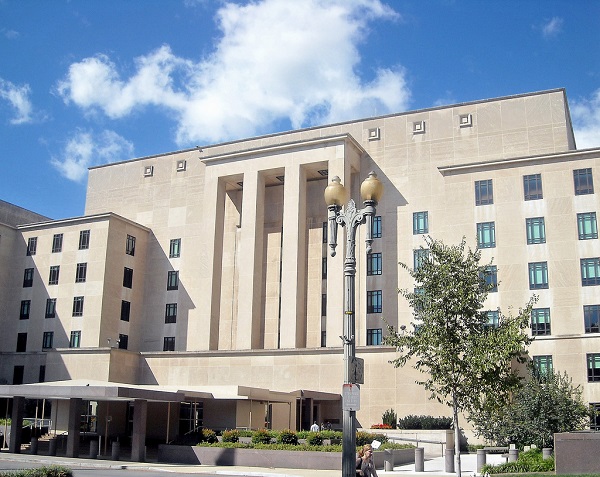The Trump administration has a dismal record when it comes to transparency. Since the president’s inauguration, several government agencies have stripped their websites of information that was previously available publicly. Data has been removed from the websites of the Environmental Protection Agency, the Department of Agriculture, and the Department of Education, among others. At the same time, the backlog of Freedom of Information Act requests has continued to grow. So historians were rightfully alarmed last December when the State Department Policy Planning Staff denied a request from State’s Office of the Historian to renew the terms of three members of the Advisory Committee on Historical Diplomatic Documentation (known as the Historical Advisory Committee, or HAC).

Until recently, the State Department approved renewal requests from the Historical Advisory Committee as a matter of course. AgnosticPreachersKid/Wikimedia Commons/CC BY-SA 3.0
Made up of scholars of US foreign relations, the HAC advises the State Department Office of the Historian on aspects of declassifying and publishing diplomatic papers and documents, most crucially the Foreign Relations of the United States (FRUS) series—by law, one of the major responsibilities of the Historian’s Office. First published in 1861, the FRUS series now includes more than 480 individual volumes of government documents related to the history of American foreign policy and diplomatic relations. The HAC, in the wording of a 1991 statute that formalized the body, “advise[s] and make[s] recommendations to the Historian concerning all aspects of preparation and publication of the FRUS series.” It monitors the compilation and editorial processes of the series and advises on any problems brought to its attention. Because the HAC’s involvement helps ensure transparency during the production process, interference by political appointees is cause for concern.
When the HAC was first informed in December about the refusal of its request to renew three members, AHA delegate and chair Richard Immerman, professor and emeritus director of the Center for the Study of Force and Diplomacy at Temple University, requested an explanation through the acting assistant secretary for public affairs, Susan Stevenson. But “no reasons for the denial . . . were offered,” he told Perspectives. That, and the lack of any forthcoming information, said Immerman, were “unprecedented.”
In recent memory at least, the leadership of the State Department always approved such renewal requests as a matter of course. As a body with statutory responsibility to oversee the work of the Historian’s Office, the HAC requires autonomy to be effective in its role. Concerned that the most recent denial was politically motivated, HAC member Robert J. McMahon, who represents the Society for Historians of American Foreign Relations (SHAFR), resigned from his post earlier this year. The State Department leadership’s involvement in the renewal process, says Immerman, raises concerns, about “not only the HAC’s effectiveness but also its independence.”
The denial and the lack of any forthcoming information, according to committee chair Richard Immerman, were “unprecedented.”
The HAC comprises nine scholars, six of whom represent major associations with an interest in the history of American foreign relations. The associations include the AHA, the American Political Science Association (APSA), the Society of American Archivists (SAA), SHAFR, the Organization of American Historians, and the American Society of International Law (ASIL). Three other committee members serve at large and are chosen by the Historian’s Office. The three who were told last December that their services would no longer be required were James McAllister, representing the APSA, and Thomas Zeiler and Katherine A. S. Sibley, both at-large members.
The original objective of the FRUS series was to fulfill congressional demands for documentation of Executive Branch activities. Transparency and oversight were imperative from the very beginning. Over time, FRUS has become less about the immediate needs of government and more about historical accuracy and long-term accountability. As former director of the Historian’s Office Stephen P. Randolph wrote in the foreword to Toward “Thorough, Accurate, and Reliable”: A History of the Foreign Relations of the United States Series (2015), “The series’s longevity testifies to the power of the ideal it represents and upholds—of the need for transparency and accountability in a democratic system.”
The creation of the HAC sprang from the 1955 publication of a FRUS volume on the 1945 Yalta Conference. The volume attracted international attention, and the controversy surrounding its publication—the New York Times included its publication date among its list of the 50 most important dates of 1955—led the State Department to constitute the HAC and to allow scholars oversight of it.
Almost from the beginning, the State Department’s leadership was concerned that the HAC would interfere with foreign policy by pushing for publishing diplomatic papers as quickly as possible. In recent years, the HAC’s existence has been less contentious. Randolph, who served from 2012 to 2017, found the HAC beneficial to the work of the Historian’s Office. In a phone interview, Randolph emphasized the HAC’s dual mandate of “assessing and validating” work on the FRUS volumes and providing oversight of declassification processes. As Historian, he often looked to the HAC for “advice, both formal and informal,” and characterized his relationship with its members as “solid and effective.” Committee members, in his words, are “committed to the series and the work of the committee.”
According to statute, HAC members should hold three-year staggered terms, and three of the nine members should be replaced each year. Over the years, however, this pattern eroded because of the realities of publishing FRUS. Randolph explained to Perspectives that due to the complexity of the process involved in publishing FRUS, extended service on the HAC was incredibly beneficial to the Historian’s Office. During Randolph’s tenure as Historian, no requests for renewal were denied, and HAC membership was stable. Immerman, for example, has served on the committee since 2009. In fact, many HAC members have served longer than their original appointed terms and have been reappointed a number of times. Trudy Peterson, former acting archivist of the United States and SAA’s representative on the HAC, said in an email that she thinks “rotation of members is important.” Because of irregular renewals in the past, however, the terms of eight of the nine current members, including all three at-large members, face expiration during a single 12-month period.
In a letter to Stevenson, now principal deputy assistant secretary of the Bureau for Public Affairs, Immerman argued that losing so many members in such a short time would be harmful to the committee’s ability to carry out its responsibilities. To ensure continuity and maintenance of a high level of expertise, Immerman asked the State Department leadership to work toward re-establishing the legislatively mandated process. The HAC’s “effectiveness,” he wrote, “depends on experience and expertise, which the loss of such a high percentage of our membership would dangerously degrade. It took each of us years to learn what was necessary to fulfill our responsibilities.”
Robert McMahon, who had served on the committee since 2003, resigned in June.
Out of concern for retaining the combined expertise of the committee’s members and continuity, the HAC and Immerman proposed a staggered rotation that would create an orderly turnover of members starting in September 2018. After negotiation, the State Department Policy Planning Staff agreed to follow this recommendation. As a result, over the next two years all current HAC members will rotate off and be replaced. Associations represented on the HAC will each submit three names for consideration. The Historian’s Office, in consultation with the HAC, will likewise recommend three names for new at-large members. This arrangement, says Immerman, will “ensure sufficient continuity of experience and expertise. Because the learning curve is so steep, for the HAC to be at all effective it requires that continuity.”
In addition to the three members who will be rotating off as part of the organized transfer of responsibilities, the HAC has lost another member. McMahon, who had served on the committee since 2003, resigned in June, in response to the rejection of the renewal requests and subsequent lack of explanation. McMahon explained to Perspectives that he could not continue to serve on the committee in good faith in light of recent events. He subsequently shared a letter he recently sent to the president of SHAFR stating his view that the denial of renewal requests was a result of “politicizing a committee of non-partisan, academic experts.”
Why the Policy Planning Staff took the unprecedented decision to deny the renewal request remains unclear. An official at the State Department told Perspectives that the end of the terms of the three members whose appointments were not renewed was “consistent with . . . statute.” The official also stated that the department was working “hand in hand” with the HAC and Immerman “to listen to and satisfy the requests of the Committee on how to move forward in regularly renewing the membership, as was the law’s intent.”
Immerman expressed satisfaction with the agreement to stagger replacements. HAC member Mary Dudziak, a legal historian who represents ASIL, said in an email that she “supports the leadership of the HAC.” Through reasoned argument and open dialogue, the committee members were able to convince the politically appointed leadership of the HAC’s importance and the need for its independence. An orderly transition will allow continuity, but with the entire body set for replacement over the next two years, concerns remain about the collective loss of expertise. With openness increasingly under threat, the committee’s continued input into FRUS will, members hope, ensure transparency in this one very important area of government activity.
Seth Denbo is director of scholarly communication and digital initiatives at the AHA. He tweets @seth_denbo.
Tags: News North America Political History Government
Comment
Please read our commenting and letters policy before submitting.







